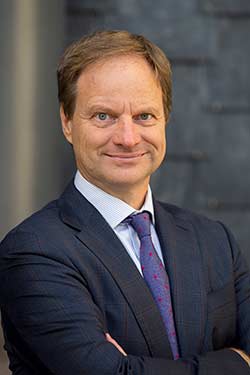
Renowned Scientist to Discuss Role of Livestock Production in Today’s Society
July 22, 2024
Scientist Peer Ederer, whose international company conducts research and communicates scientific evidence about the role of animals in the global food system, will be the featured speaker for the Henry C. Gardiner Global Food Systems lecture Oct. 7 at Kansas State University.
Ederer’s talk–titled ‘Scientific Evidence Behind the Role of Livestock and Meat Production in a Global Society’–begins at 7 p.m. in K-State’s McCain Auditorium. Admission is free. The lecture will also be available on the day of the event by video livestream.
Ederer has been involved in scientific research in cooperation with leading universities around the world for more than two decades. In 2020, he formed the company GOAL Sciences–which stands for the Global Observatory of Accurate Livestock Sciences–to encourage accurate scientific data regarding livestock production around the world.
He is also a member of the Scientific Council of the World Farmers Organisation.
In 2022, Ederer was a driving force in developing the Dublin Declaration, a report drafted “to give voice to the many scientists around the world who research diligently, honestly and successfully in the various disciplines in order to achieve a balanced view of the future of animal agriculture.”
As of May, 1,204 scientists have signed their support for that document.
“The Dublin Declaration tried to achieve three things,” Ederer said. “First of all, as scientists, we wanted to ensure that when we talk about livestock, we are talking from all of its many perspectives; three of those perspectives are nutrition; environment and ecology; and then society and ethics.”
Each of the perspectives, he said, has many parts.
“In nutrition, you have negative impacts on health that food can have, but you also have the nourishing effects. In environment, we talk about biodiversity, water, land utilization and climate. And regarding society, we have economic, social and ethical issues.”
The other two achievements of the Dublin Declaration, Ederer said, is it asked policymakers to draw policy on the basis of scientific evidence–“not on the basis of scientists, not on what is said, instead it is the scientific evidence that matters”–and secondly giving voice to scientists who are doing relevant work in studying livestock.
“The Dublin Declaration mobilized scientists around the world and gave them a voice,” Ederer said. “It tells them that they’re not the only one’s thinking about livestock. It gives the field (of animal research) the courage to know that there is a solid future for livestock in our societies.”
Ederer notes that establishing scientific basis for decisions regarding livestock production brings clearer understanding to arguments for reducing the consumption of meat.
“That line of thinking is being driven by arguments of health, environment and ethics,” he said.
He called arguments for eliminating red meat in a diet due to health concerns “bogus.”
“There’s just simply no scientific evidence. At the same time, we know of many health benefits, including nutrient density, protein density, bioavailability of amino acids and critical nutrients like iron, zinc, vitamin B12 and more.”
Ederer said current science also disproves a commonly held belief that livestock production–particularly cattle production–increases the presence of carbon in the environment, ultimately contributing to climate change and global warming.
“The cow does emit methane, and that methane will deteriorate after some period of time in the atmosphere,” he said. “During that time period, while the carbon molecule is in the form of methane, rather than carbon dioxide, it is more climate active. So, for that short period of time, there is an additional warming impulse.”
But cattle and other ruminant animals are also directly and indirectly involved in storing carbon in soil by feeding on grasses and other carbon sources.
“These two factors need to be squared against each other,” Ederer said. “It turns out that in many cases, the carbon sequestration effect created by ruminants is higher or at least compensates for the short period of time that methane is in the air.”
Simply, he notes, “livestock do not create a significant net addition to carbon in the environment.”
Kansas State University established the Henry C. Gardiner Global Food Systems lecture series to provide science-based education about world food issues. The series allows students, faculty, staff and Kansas citizens to interact with U.S. and international food industry leaders on topics of current interest.
The lecture series is funded by the Gardiner family of Ashland, Kansas. Henry C. Gardiner, who passed away just days before the first lecture in 2015, was known as a visionary leader who dedicated his career to improving the beef industry through science and technology.
Organizers are planning a day-long conference on Oct. 7 to commemorate the tenth year of the lecture series. The conference agenda and information on how to register is available here.